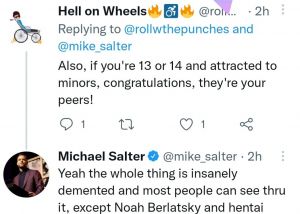Debate Guide: Corresponding age attraction: Difference between revisions
No edit summary |
No edit summary |
||
| Line 1: | Line 1: | ||
[[File:Screenshot 20210829-024225 Twitter.jpg|thumb|The underpinning assumption works | [[File:Screenshot 20210829-024225 Twitter.jpg|thumb|The underpinning assumption works in the same way as an argument from ignorance (X has only ever tried Coca Cola (and likes it) so X prefers Coca Cola to Pepsi). However, the fallacious reasoning is rarely qualified in such a way]] | ||
:''"It is both normal and acceptable for children to express a childish sexuality towards one another, but any such feelings among adults are abnormal and problematic. This is because erotic age preference tends to correlate with one's own age throughout life, or at least until adulthood"'' | :''"It is both normal and acceptable for children to express a childish sexuality towards one another, but any such feelings among adults are abnormal and problematic. This is because erotic age preference tends to correlate with one's own age throughout life, or at least until adulthood"'' | ||
<hr> | <hr> | ||
Revision as of 06:40, 9 December 2021

- "It is both normal and acceptable for children to express a childish sexuality towards one another, but any such feelings among adults are abnormal and problematic. This is because erotic age preference tends to correlate with one's own age throughout life, or at least until adulthood"
A person's core age attraction is unlikely to shift in line with their age, or as they progress through puberty. While it is socially normative these days for minors to date among their school peer group and show their affection for one another, this says more about situational factors (proximity, experience, etc) and received standards than any inherent aspect of human nature. Western society forces minors into same-age peer groups thru the education system and indoctrinates them with the idea of an "age appropriate" chronophilia and courtship.
Such a fundamental change in chronophilia would require more than changing sex hormones, but actual physical changes to the parts of the brain which control sexual attractions. With some theorists suggesting that abnormal brain structure and even physical trauma are causes of pedophilic attractions, one would have to ask how similar attractions and urges can be expressed as a normative "developmental phase" among youth, only to disappear completely as the person progresses to adulthood.
It has long been known by those experiencing a true, pedophilic attraction, that such an orientation becomes apparent very early in life.[1] In the words of former DSM editor, Michael First "If you're attracted to children at age 13 you’re going to be attracted to children at age 70." Others would seem to confirm this. This supposed "age appropriate chronophilia" theory is contradicted by studies covering the attraction of females to adult and infant faces [2][3] before and after menarche, and Kenrick's research on boys:
- "Although teenage males were willing to date girls slightly younger than themselves, they indicated a much wider range of acceptability above their own ages, and also reported that their ideally attractive partners would be several years older than themselves. Preferences of teenage females were similar in pattern to those of adult females, ranging, on average, from their own age to several years older."[4]
This puts boys in the same ball-park as adult males - i.e. a strong attraction to the neoteny of a post pubertal girl or woman.